QuantumX seeks to cultivate a workforce with expertise in quantum science, engineering and technology
Quantum-related courses are offered through the UW departments of Physics, Chemistry, Chemical Engineering, Electrical & Computer Engineering, Computer Science & Engineering, and Materials Science & Engineering. Courses for both graduate (day program) and undergraduate students are available.
Accelerating Quantum-Enabled Technologies (AQET), a new National Science Foundation Research Training program for UW graduate students, is one of the first quantum information science and technology programs to bring hardware and software scientists and engineers together at the trainee level. AQET trainees acquire the skills to develop new quantum materials, devices, and algorithms for applications in computation, communication, and sensing.
The Graduate Certificate in Quantum Information Science and Engineering (QISE) is available for all UW Graduate Students (day program). This Graduate Certificate in QISE is what all AQET trainees will receive after completing the program, but it can also be earned by students outside of the AQET NRT program.
UW’s Quantum Technologies Training and Testbed lab (QT3) is a unique combined teaching and user facility which performs research, develops instructional labs and provides state-of-the-art characterization tools for quantum information science and engineering. The mission of the lab is to provide hands-on access to quantum technology hardware to accelerate both research and training in this growing field.

